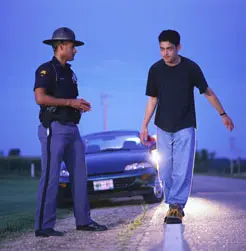 Driving under the influence, or DUI, is the act of operating a motor vehicle while under the influence of drugs or alcohol in excess of a legal limit. The limit for alcohol is 0.08 percent in all 50 states at the present time, but drivers under the age of 21 can be prosecuted if it is determined that the driver has consumed any alcohol. Commercial drivers can be convicted of DUI if the blood alcohol level is 0.04 or greater. If a driver is proven to have been under the influence of illegal drugs or legal drugs that carry a warning against operating a motor vehicle, the driver may also be charged with DUI. Different states may carry different punishments for DUI.
Driving under the influence, or DUI, is the act of operating a motor vehicle while under the influence of drugs or alcohol in excess of a legal limit. The limit for alcohol is 0.08 percent in all 50 states at the present time, but drivers under the age of 21 can be prosecuted if it is determined that the driver has consumed any alcohol. Commercial drivers can be convicted of DUI if the blood alcohol level is 0.04 or greater. If a driver is proven to have been under the influence of illegal drugs or legal drugs that carry a warning against operating a motor vehicle, the driver may also be charged with DUI. Different states may carry different punishments for DUI.
DUI Charges and Repercussions
In most cases, DUI is considered to be a misdemeanor. However, if a person is habitually convicted of DUI or causes damage or injuries, DUI may be considered a felony. DUI may also be considered a felony if a second offense is committed within a certain period of time.
Punishments for DUI in Florida
Being convicted of DUI may be punishable by fines and jail or prison time, depending on the nature of the offense. In addition to these punishments, the offender’s drivers’ license is suspended and the DUI is visible on the offender’s driving records. In some cases, those that have been charged with a DUI may lose their job or become ineligible for certain jobs. Having been arrested for a DUI can also tarnish personal reputations and relationships.
DUI charges may also incur the following punishments:
- Community service
- Probation
- Vehicle impoundment
- Mandatory victim awareness program
Financial Setbacks from DUI
Following a DUI, it can be costly to reinstate a drivers’ license and acquire insurance. States may mandate that a certain amount or type of insurance is acquired following a DUI conviction in order for the offender to drive legally. This can mean an increase of hundreds of dollars a year spent on car insurance. In some cases, these costs can prevent drivers from reinstating drivers’ license and insurance, which may also affect the ability to work and gain income.
Importance of Orlando DUI Attorneys
When an individual is arrested for DUI, hiring a DUI attorney for representation should be the first thing that the individual does following release. DUI attorneys are experts when it comes to state DUI laws and penalties. DUI attorneys may be able to obtain reduced fines and penalties for those that have been arrested for DUI, or may be able to disprove the charge entirely.
DUI Defense for Alcohol
If a DUI conviction is for alcohol, the prosecution will usually rely on breathalyzer results to prove that the blood alcohol level was above the legal limit. However, these results can be inaccurate due to errors on the part of the officer or improper calibration of the machine. If a blood test was taken, errors on the part of the lab technician or contaminants may skew results. While it is very difficult for defendants to contest this evidence alone, an experienced DUI lawyer may provide the assistance necessary to question the validity of these results.
Contesting Field Sobriety Results
Field sobriety tests may make it appear that a defendant was under the influence of alcohol or drugs, when the defendant was not. Nerves and other factors may make it difficult for an individual to perform the tests requested by the arresting officer. A DUI attorney may be able to have field sobriety results disregarded.
DUI Defense for Drugs
In many cases in which an individual is accused of driver under the influence of drugs, there is no concrete evidence to prove that this was the case. It is often more difficult to prove that the defendant was in fact under the influence of drugs, and the arresting officer may be required to testify. A DUI attorney may be able to assist the defendant in disputing testimony or in disproving evidence.
Sources:
“DUI & DWI.” DMV.org, 1 Jan. 2014. Web. 20 May 2014. <http://www.dmv.org/automotive-law/dui.php>
“Official Website Florida Department of Highway Safety and Motor Vehicles.” Official Website Florida Department of Highway Safety and Motor Vehicles. State of Florida, 1 Jan. 2009. Web. 20 May 2014.
View Article Sources
“Statutes & Constitution: View Statutes: Online Sunshine.” Statutes & Constitution: View Statutes: Online Sunshine. The Florida Legislature, 20 May 2014. Web. 20 May 2014.
View Article Sources
